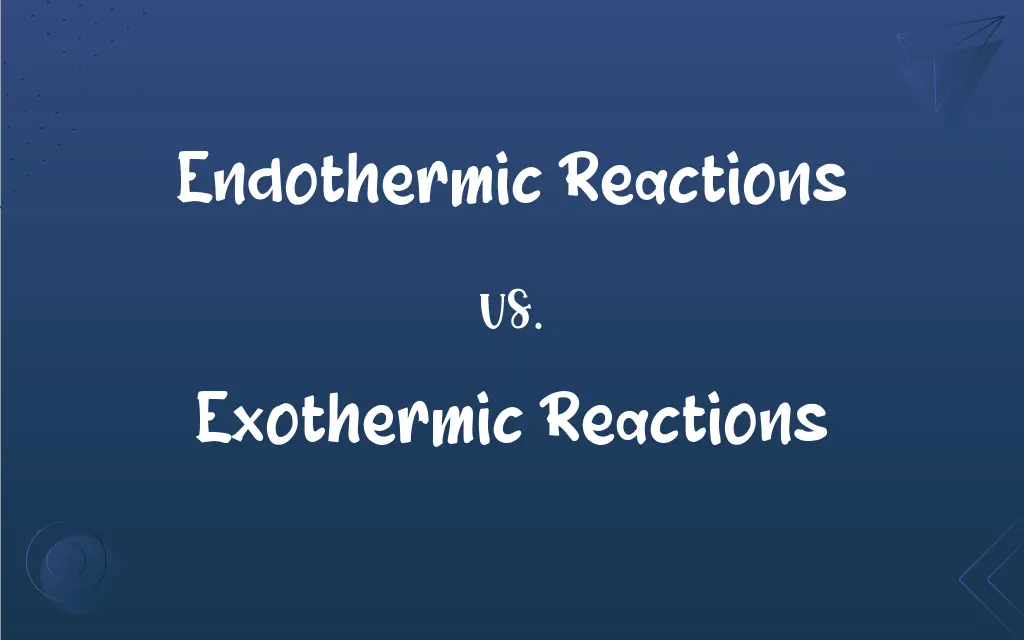Endothermic Reactions vs. Exothermic Reactions: What's the Difference?
Edited by Aimie Carlson || By Harlon Moss || Updated on October 15, 2023
Endothermic reactions absorb heat, exothermic reactions release it.

Key Differences
Endothermic reactions are chemical processes that absorb energy from their surroundings, typically in the form of heat. Conversely, exothermic reactions are those that release energy, generally as heat, into their environment. Both endothermic and exothermic reactions involve the transformation of substances; however, the energy flow distinguishes them.
In endothermic reactions, the system gains heat as the surroundings cool down. On the other hand, exothermic reactions result in the system losing heat, causing the surroundings to warm up. Both endothermic and exothermic reactions are fundamental concepts in thermodynamics, playing critical roles in various natural and industrial processes.
Endothermic reactions require energy input to proceed, meaning their products have more energy than their reactants. In contrast, exothermic reactions release energy, ending with products having less energy than the reactants. Both endothermic and exothermic reactions are under constant study in chemistry for energy management.
Analyzing endothermic reactions often involves identifying the absorption of heat and a consequent decrease in temperature. In contrast, exothermic reactions are characterized by the release of heat and an observable increase in temperature. Both endothermic and exothermic reactions have vast applications, including manufacturing, ecology, and technology.
Endothermic reactions are integral to photosynthesis in plants, where solar energy is absorbed to form glucose from carbon dioxide and water. Exothermic reactions are exemplified by combustion, where substances like fossil fuels release energy. Both endothermic and exothermic reactions, therefore, sustain life and industrial activities on Earth.
ADVERTISEMENT
Comparison Chart
Energy Flow
Absorb energy from surroundings.
Release energy to surroundings.
Surrounding Temperature
Leads to a decrease in temperature.
Leads to an increase in temperature.
Bond Energy
Products have higher bond energy.
Products have lower bond energy.
Reaction Examples
Photosynthesis.
Combustion.
Real-life Application
Cold packs.
Heat packs.
ADVERTISEMENT
Endothermic Reactions and Exothermic Reactions Definitions
Endothermic Reactions
Endothermic reactions involve the intake of energy, leading to higher energy products.
Photosynthesis is an endothermic reaction as plants absorb sunlight to synthesize glucose.
Exothermic Reactions
Exothermic reactions involve the emission of energy, leading to lower energy products.
The rusting of iron is an exothermic reaction because it releases energy.
Endothermic Reactions
Endothermic reactions result in a temperature decrease in the immediate environment.
A cold pack gets cold due to an endothermic reaction inside, absorbing heat from the environment.
Exothermic Reactions
Exothermic reactions occur spontaneously due to the release of energy.
Respiration is an exothermic reaction, releasing energy necessary for life.
Endothermic Reactions
Endothermic reactions are processes that absorb heat energy.
Melting ice is an endothermic reaction because it absorbs heat from the surroundings.
Exothermic Reactions
Exothermic reactions have products with less energy than the reactants.
The combustion of natural gas in a stove is exothermic, producing heat.
Endothermic Reactions
Endothermic reactions require external energy sources to proceed.
Cooking an egg requires heat, making it an endothermic reaction.
Exothermic Reactions
Exothermic reactions are processes that release heat energy.
Burning wood is an exothermic reaction as it releases heat.
Endothermic Reactions
Endothermic reactions have products with more energy than the reactants.
The production of ammonia through the Haber process is endothermic, requiring heat input.
Exothermic Reactions
Exothermic reactions result in a temperature increase in the immediate environment.
A hand warmer heats up due to an exothermic reaction that releases heat.
FAQs
Are exothermic reactions common in daily life?
Yes, exothermic reactions, such as combustion in vehicles, are common.
What are endothermic reactions?
Endothermic reactions are chemical processes where energy, usually heat, is absorbed from the surroundings.
Why do endothermic reactions feel cold?
Endothermic reactions absorb heat, causing a cooler feeling.
What characterizes exothermic reactions?
Exothermic reactions are identified by their release of energy, often as heat, into the environment.
Can endothermic reactions occur naturally?
Yes, endothermic reactions, like photosynthesis, occur naturally.
Are endothermic reactions important in industry?
Yes, endothermic reactions are crucial in processes needing heat absorption.
Do endothermic reactions have a role in human health?
Yes, certain bodily processes are endothermic, like digestion requiring energy.
Why do exothermic reactions feel hot?
Exothermic reactions release heat, raising the temperature.
What's an everyday example of exothermic reactions?
Lighting a match is an everyday exothermic reaction.
Do exothermic reactions have industrial applications?
Absolutely, exothermic reactions are vital in energy release, like in power plants.
Do endothermic reactions require more energy to start?
Typically, yes, endothermic reactions need an energy input to commence.
Are exothermic reactions generally spontaneous?
Many exothermic reactions are spontaneous as they release energy.
Can endothermic reactions be reversed?
Some endothermic reactions are reversible, depending on energy input and conditions.
Are exothermic reactions always irreversible?
Not always; some exothermic reactions can be reversible under certain conditions.
How do endothermic reactions impact the environment?
Endothermic reactions, like photosynthesis, are vital for environmental energy balance.
What role do exothermic reactions play in the environment?
Exothermic reactions, like cellular respiration, are essential for life and ecological cycles.
Can we control endothermic reactions?
Yes, by managing energy input and reaction conditions, we can control endothermic reactions.
Is it possible to control exothermic reactions?
Certainly, by manipulating the reactants and conditions, we can control exothermic reactions.
Are exothermic reactions related to health?
Yes, many body functions, like metabolism, involve exothermic reactions releasing energy.
What’s a real-life example of endothermic reactions?
A cold pack activating is an example of an endothermic reaction.
About Author
Written by
Harlon MossHarlon is a seasoned quality moderator and accomplished content writer for Difference Wiki. An alumnus of the prestigious University of California, he earned his degree in Computer Science. Leveraging his academic background, Harlon brings a meticulous and informed perspective to his work, ensuring content accuracy and excellence.
Edited by
Aimie CarlsonAimie Carlson, holding a master's degree in English literature, is a fervent English language enthusiast. She lends her writing talents to Difference Wiki, a prominent website that specializes in comparisons, offering readers insightful analyses that both captivate and inform.































































